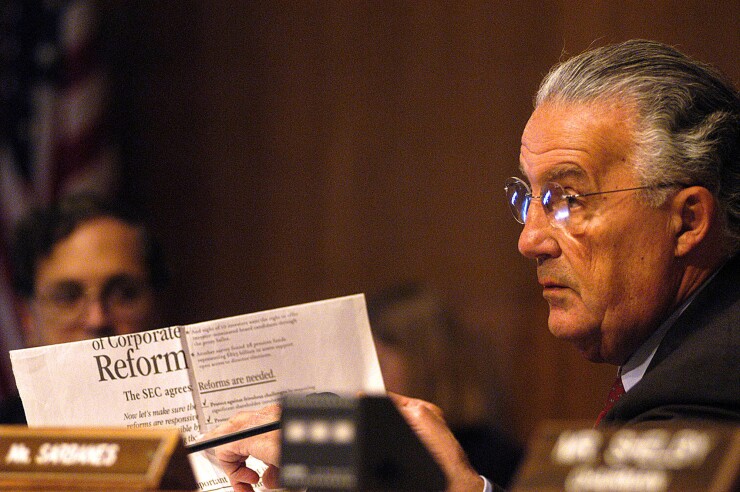Paul Sarbanes, the former U.S. senator who co-wrote the Sarbanes-Oxley Act that established the first-ever accounting oversight board following the corporate fraud that toppled Enron and WorldCom, has died. He was 87.
Sarbanes “passed away peacefully this evening in Baltimore,” according to a
The Maryland Democrat served five terms in the U.S. Senate, a 30-year tenure in which he was chairman of the Senate Banking Committee when it responded to a rash of accounting scandals. He didn’t seek a sixth term and retired on Jan. 3, 2007.
With Republican Representative Mike Oxley, Sarbanes marshaled the bill to approval in 2002 after energy trader Enron Corp. and long-distance phone provider WorldCom Inc. were driven into bankruptcy by bookkeeping abuses at the highest level of management. Oxley died in 2016 (
“Traditionally our markets have been the most transparent, reliable and efficient in the world,” Sarbanes said on July 24, 2002, the day a compromise measure was approved by congressional negotiators. “Our legislation intends to see that they merit that reputation.” President George W. Bush signed the legislation six days later.

Sarbanes’s version of the bill went further than Oxley’s, which had passed the House earlier that year. It added criminal provisions defining corporate-securities fraud as a felony and barred accountants from nine types of consulting work, compared with two proposed by the House.
The measure passed the Senate 97-0 on July 15, just three weeks after WorldCom revealed it had misreported $3.9 billion in costs as capital investments and would record losses for 2001 and the first quarter of 2002.
The final bill created the Public Company Accounting Oversight Board, subjecting a previously self-regulated profession to independent oversight for the first time. It also included a mandate requiring senior executives to vouch for the accuracy of financial statements; report on the adequacy of internal controls; provide timely disclosure of material changes; and face pay clawbacks in cases of wrongdoing and sentences of up to 20 years for obstructing justice and up to 25 years for securities fraud. In addition, the maximum sentence for mail and wire fraud was quadrupled to 20 years.
His life
Paul Spyros Sarbanes was born Feb. 3, 1933, in Salisbury, Maryland, the son of Greek immigrants Spyros Sarbanes and the former Matina Tsigounis, according to Marquis Who’s Who.
In 1954, he earned a bachelor’s degree from Princeton University and then graduated from Harvard Law School in 1960, the same year he married the former Christine Dunbar, who died in 2009. After serving as a law clerk for the U.S. Court of Appeals for the Fourth Circuit, he went into private practice.
In the early 1960s, Sarbanes was an administrative assistant to the chairman of the President’s Council of Economic Advisers and the executive director of the Charter Revision Commission of Baltimore.
He was a state legislator in Maryland from 1967 until 1971, when he was elected to the U.S. House of Representatives. In 1976, he joined the Senate, where he was chairman of the Joint Economic Committee and of the Senate Committee on Banking, Housing and Urban Affairs.
Sarbanes and his wife had three children: Michael, Janet and John, who was elected to the House in 2006.





